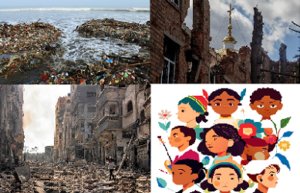
Conserving/revolutionizing and resisting
What to do if the crisis of civilization reaches human limits and continues to humanize itself ?
human limits and continues to humanize itself ?
Edgar Morin’s answer can be found in chapter 4 of the book Earth-Land when he sets out “Our terrestrial goals”, where he states: “Awareness of our terrestrial roots and our planetary destiny is a necessary condition for realizing humanity and civilizing the Earth” (Morin, 2003, p. 99), and stresses that the former is conservative and neglects “deliberately here the adjective ‘revolutionary’, which has become reactionary and very tainted with barbarism” (idem) and it is enough to see the atrocities of the escalation of current wars.
Conservative because “it is a question of preserving, of safeguarding not only the cultural and natural diversities degraded by inexorable processes of standardization and destruction, not only the civilizational conquests threatened by the returns and manifestations of barbarism” (idem p. 99) we cannot regress in the civilizational milestones we have already reached, but we must evolve.
It’s a paradox, but a justifiable one: “Conservation needs the revolution that would ensure the pursuit of hominization” (Morin, 2003, p. 100) where the paradox “apparently contradictory, conserve/revolutionize: it is the paradox progress/resist” (idem), where resisting is “being on the defensive on all fronts against the returns and manifestations of the great barbarism, written before the new millennium, this is very current in the face of the possibility of war.
To resist, for the author, is to oppose two growing barbarities: the “hateful cruelty” that expresses itself “in murder, torture, individual and collective rages” and the “anonymous cruelty that comes from the techno-bureaucratic barbarity” of assumed or presumed totalitarian states.
Thus, the author, who speaks of “hyper-specialization”, “anonymization, abstraction, commodification, which together lead to the loss not only of the global”, sees the imperative need to resist this mentality, which necessarily leads to barbarism and the process of degradation.
Thus the search “for hominization must be conceived as the development of our psychic, spiritual, ethical, cultural and social potentialities” (p. 101) is part of this paradox of resisting/revolutionizing, so development must be conceived in an anthropological way, i.e. “breaking with the conception of progress as a historical certainty in order to make it an uncertain possibility…” (p. 102).
And he adds that he must “understand that no development is acquired forever: like all living and human things, it suffers the attack of the principle of degradation and needs to be constantly regenerated” (p. 102) and points out the false idea of development, because “: the underdevelopment of the developed increases precisely with their techno-economic development” (p. 104), war and conflict are precisely the “developed”.
Thus the notion of underdevelopment: “however barbaric it may be, it establishes an anthropological link between the so-called developed and the so-called underdeveloped; it encourages useful technical and medical aid – drilling wells, developing energy sources, fighting endemic diseases and nutritional deficiencies – even though it is carried out under conditions of economic exploitation, natural degradation and miserable urbanization that cause new evils” (p. 105).
It is therefore necessary to “tolerate” differences and even establish advantages over them, to no longer ignore or demonize different cultures, to establish aid and agreements for global development and the process of broad humanization, which the author calls “hominization”.
Morin, Edgar Morin & Kern, Anne-Brigitte. (2003) Terra-Patria. Transl. Paulo Azevedo Neves da Silva. Brazil, Porto Alegre : Sulina.









